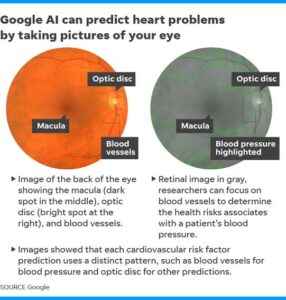In recent years, artificial intelligence (AI) has been at the forefront of transformative advancements across various industries, including healthcare. One notable area of progress is the use of AI in predicting heart disease through eye scans. Google’s innovative approach has gained attention for its potential to revolutionize disease diagnosis and treatment.
By leveraging deep learning and machine learning techniques, Google has developed a sophisticated system that can analyze retinal scans to predict an individual’s risk of heart disease. This groundbreaking technology holds promise for the future of AI in healthcare, offering early intervention and personalized care.

Google’s AI technology has the potential to assess heart health by analyzing eye scans. The algorithm, developed by Google, aims to demonstrate that the eyes can provide insights into cardiovascular health. By matching eye scans with a matrix for cardiovascular risks, the technology has shown a 70% accuracy in predicting heart conditions. This innovative approach utilizes deep learning models based on retinal images to predict risk factors such as age, gender, blood pressure, and smoking status, which are significant indicators of heart disease.
Read Also: A’ Ibom works commissioner tasks project engineers to hold contractors accountable
Recent scientific research has revealed that the eyes can provide valuable insights into heart health. Studies have shown that subtle changes in the blood vessels of the retina, such as narrowing, branching patterns, and microaneurysms, can serve as early indicators of heart disease risk factors like hypertension, diabetes, and high cholesterol.
Google’s AI-powered algorithms have been developed to analyze retinal scans to predict an individual’s risk of heart disease. This innovative approach has the potential to revolutionize disease diagnosis and treatment. The technology has been shown to accurately predict a person’s risk of heart disease in less than a minute, making it a highly effective, non-invasive test for people at medium to high risk of heart disease.
The future is here and it’s been powered by AI.







